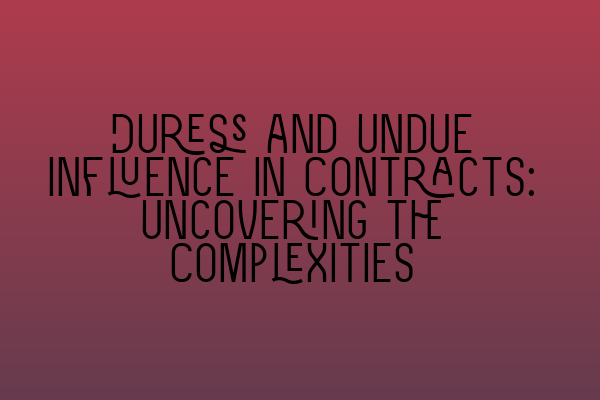Duress and Undue Influence in Contracts: Uncovering the Complexities
When it comes to contract law, one aspect that can significantly impact the validity of a contract is the presence of duress and undue influence. These two terms refer to situations where one party exerts pressure or influence on another party, leading them to enter into a contract against their free will or better judgment. Understanding these complexities is vital for both solicitors and individuals involved in contract negotiations.
Duress occurs when one party uses threats, violence, or other forms of coercion to induce the other party to enter into a contract. This can include physical harm, blackmail, or even economic pressure. The key aspect of duress is that it leaves the coerced party with no meaningful choice but to enter into the contract. In such cases, the party under duress may have legal grounds to argue that the contract is voidable.
On the other hand, undue influence refers to situations where one party takes advantage of a position of power or trust to unfairly influence the decisions of the other party. This can include situations where there is a fiduciary relationship, such as between a lawyer and a client, or a parent and a child. Undue influence can also arise when there is a significant power imbalance between the parties, making it difficult for the influenced party to freely negotiate the terms of the contract.
It is essential to note that duress and undue influence are not always easy to prove in legal proceedings. The burden of proof lies with the party claiming duress or undue influence, and they must demonstrate sufficient evidence to substantiate their claim. This can include testimonies, documents, or other forms of evidence that illustrate the presence of coercion or unfair influence.
In contract law, the presence of duress and undue influence can lead to the contract being declared void or voidable. A void contract is considered null and void from the beginning, as if it never existed in the first place. On the other hand, a voidable contract is one that is initially considered valid but can be voided at the option of the party who was coerced or unduly influenced.
To properly navigate the complexities of duress and undue influence in contracts, it is crucial to seek the assistance of a qualified solicitor. They can assess the circumstances surrounding the contract and determine the best course of action. Additionally, solicitors can help gather the necessary evidence and build a strong case in support of their client’s claim of duress or undue influence.
In conclusion, duress and undue influence pose significant challenges in contract law. Recognizing these complexities is vital for both solicitors and individuals involved in contract negotiations. By understanding the intricacies of duress and undue influence, parties can protect their rights and ensure the validity of the contracts they enter into.
For further practice and preparation for the SQE exams, you may find the following articles helpful:
– SQE 1 Practice Exam Questions
– SQE 1 Practice Mocks FLK1 FLK2
– SQE 2 Preparation Courses
– SQE 1 Preparation Courses
– SRA SQE Exam Dates
Remember, when it comes to contract law, staying informed and seeking professional guidance is key to ensuring your rights and protecting yourself from any potential duress or undue influence.
